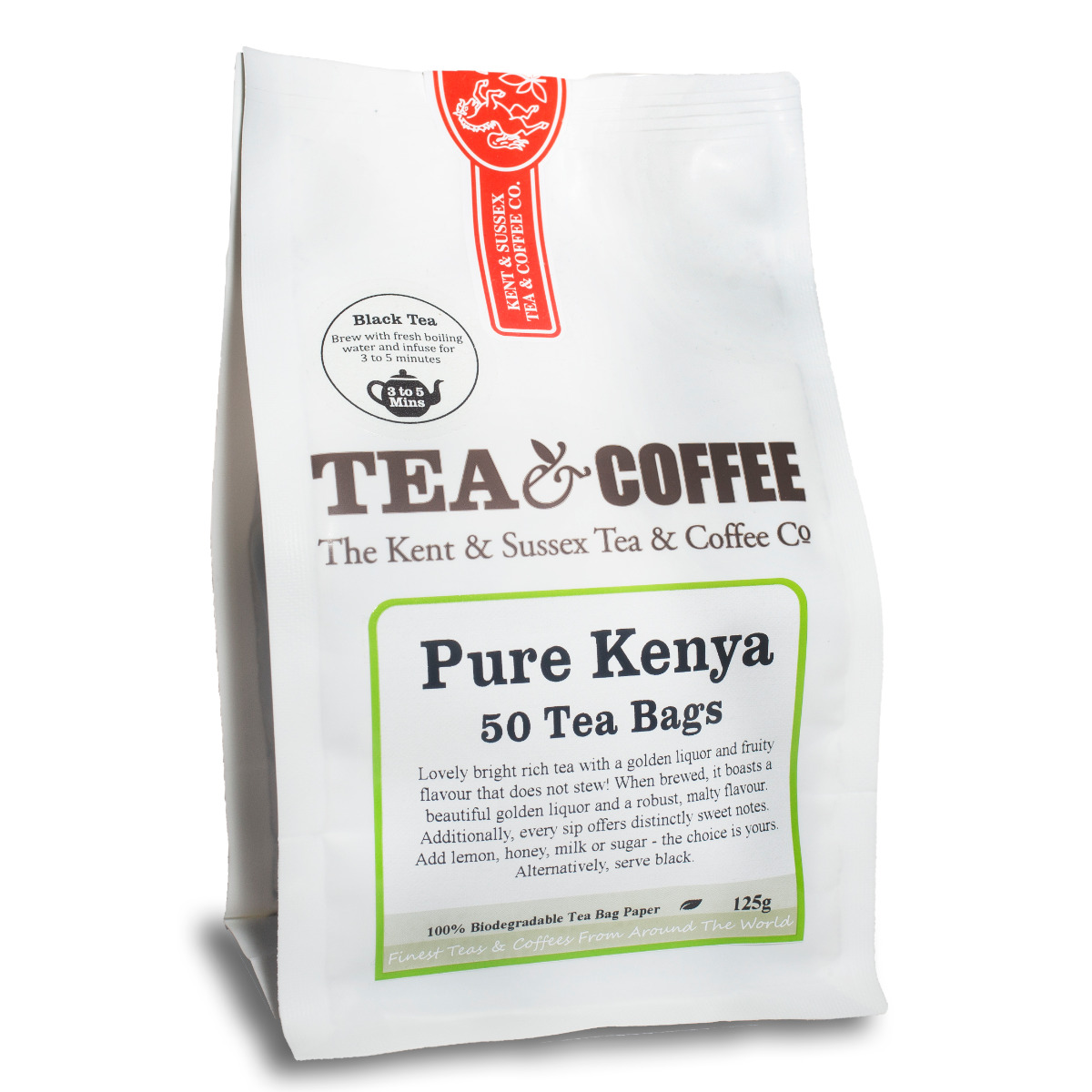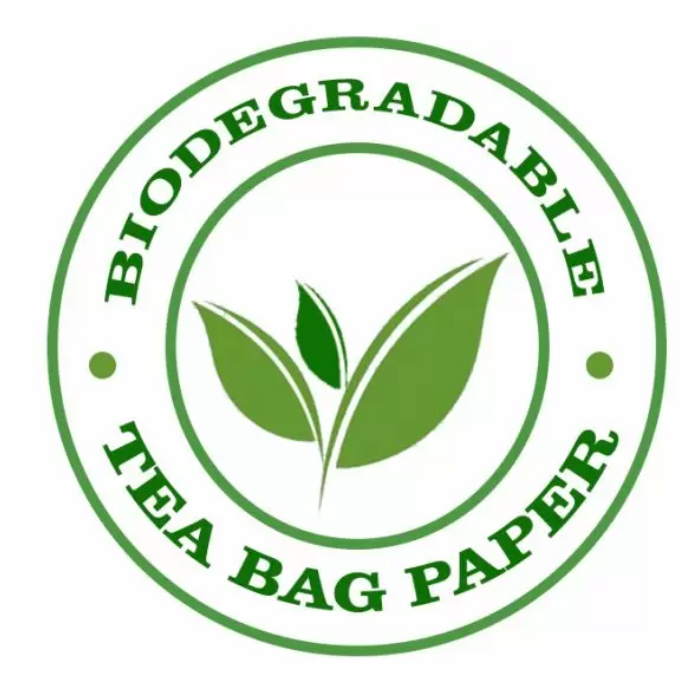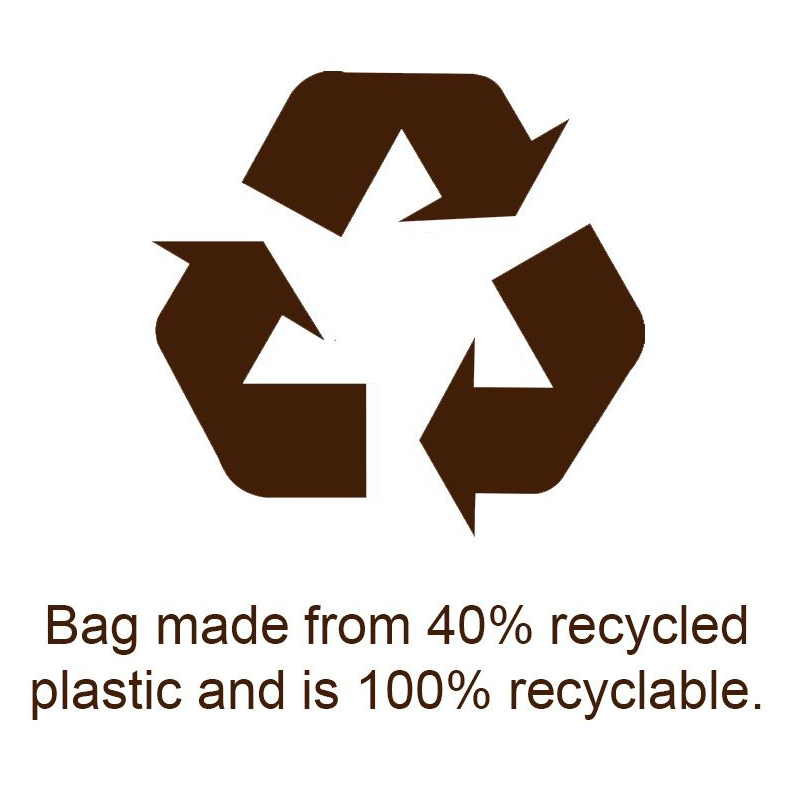Black Tea Brewing Guide

1 Teaspoon
Add 1 teaspoon per person and one for the pot.

95⁰c - 100⁰c
Boil using fresh water, at a temperature of 95⁰ - 100⁰c.

3 - 5 Mins
Steep for 3-5 minutes, depending on personal preference
About Product
-
Product Description
Kenya Tea Bags come from the East African country of the same name. Each pocket of goodness is of single-origin, with close associations with the Kenya Tea Development Agency Holdings Ltd (KTDA).
When brewed, it boasts a beautiful golden liquor and a robust, malty flavour. Additionally, every sip offers distinctly sweet notes. We pack it fresh to order here at our Kent-based factory.
It’s worth noting, too, that our wholesome, invigorating Kenya Tea Bags contain a higher amount of caffeine. This stimulating chemical compound, as most people will know already, provides an energy boost upon consumption.
Specifically, it has around 45-mg of caffeine per 8-oz cup, which should, in theory, be more than enough to start your day the right way.
History of Tea in Kenya
According to legend, drinking Tea dates back to 2737 BCE. Kenya Tea, in particular, however, only came into existence in 1903. The first person to plant Tea in Kenya was a British settler called G.W.L. Caine – albeit for ornamental purposes.
It would take a few more years before someone else, specifically a Scot named Arnold Butler McDonell, realised its commercial potential.
In 1910, Mr. McDonell purchased 350 acres from the British government to establish a farm 20 miles from Nairobi. Initially, he had planned to grow Coffee throughout his plot at Kiambethu – but his crop failed.
In 1918, following nearly ten years of disappointment, McDonell tried planting Tea of the Indian Camellia sinensis var assamica variety. It worked.
Where is Tea Grown in Kenya?
The legacy of Arnold Butler McDonell remains as strong as ever. There are around 550,000 Tea farmers in Kenya today, most of whom are small estate owners.
Much of the country’s crop comes from the highlands within relative proximity to the Rift Valley. It often grows at high altitudes between 1,500-2,700 metres, which contributes significantly to its outstanding quality.
The Truth About Plastic Tea Bags Microplastics
Have you ever wondered “what are Tea Bags made of?” The answer, in most cases, is Plastic Tea Bags Microplastics. This isn’t the way we do things, however, having recently introduced our Tea Bags without plastic.
These we make using a combination of wood pulp and vegetable starch, which is technically classified as a “bio-plastic.” Although not a perfect solution, it is better than petrochemical materials.
Here at The Kent and Sussex Tea and Coffee Company, we’re continuously striving for a more sustainable future in the industry.
Our Kenya Tea Bags stand testament to our ongoing effort. Perhaps best of all, this has no influence on its remarkable character and profile. You can compost them, too, thus making it a win on all fronts. Why not buy eco-friendly Kenya Tea Bags today?
How to Brew Kenya Tea Bags
1, Position the Tea Bag in your cup.
2, Begin brewing by pouring in freshly boiled water.
3, Allow it to steep for 3-5 minutes.
How to Serve: Milk, or milk alternatives, sugar, honey or lemon – the choice is yours. Alternatively, serve black.
Kenya Black Tea Benefits: The fact that this infusion is a Black Tea means that it boasts two particularly special antioxidants, theaflavin and thearubigin.
These chemical compounds do much to support your health and wellbeing, including combating free radicals in the body. In doing so, your morning cuppa can reduce the risk of developing numerous chronic conditions.
-
Delivery Information
We offer reliable delivery services through Royal Mail to ensure that your orders reach you on time.
Here are the main points you should be aware of:
- Standard UK Delivery: £3.95 excluding delivery charge.
- Delivery Times: Orders are processed and dispatched within 2-5 working days but they may take longer during busy times. It is worth noting that all our orders are packed by hand in order to maintain the quality.
- Free Delivery: We are delighted to provide free shipping for UK orders over £35*. Moreover, customers from Europe can enjoy free shipping for any purchase above €75*. Furthermore, we offer free delivery in the USA for all purchases exceeding $125*. Please note terms and conditions may apply.
- Tracking: When your package is sent you will receive a tracking number via email so as to keep tabs of its progress.
International Shipping
We do ship worldwide meaning our products can be accessed by anyone around the world.
Here are some important details:
- Delivery Times: International deliveries vary based on destination, generally taking between 7-14 working days.
- Shipping Costs: International shipping costs are calculated at checkout based on your location and weight of your order. View full delivery charges for your location.
- Customs and Import Duties: Remember customs or import duties may exist depending on regulations in your country; these charges are borne by the customer.
Returns Policy
Your satisfaction is our top priority, however if for any reasons you’re not completely happy with your purchase, simply follow our returns procedure:
- Eligibility: Items returned within 30 days of receipt must remain unopened and in their original condition.
- Process: In order to return an item contact our customer service department using your unique order number after which detailed instructions will be given concerning returning them back to us securely.
- Refunds: Our aim is to refund you within 5-7 working days upon successful reception of returned goods. The refund amount will be credited to your original payment method.
For any other Enquiries or help please contact our Customer Support Team always at your service.
-
Product Reviews

 Loose Leaf Tea
Loose Leaf Tea Pyramids
Pyramids Tea Bags
Tea Bags Africa
Africa Assam
Assam Ceylon
Ceylon Chinese
Chinese Darjeeling
Darjeeling European
European Indian
Indian Japan
Japan Nepal
Nepal South East Asia
South East Asia Ayurveda Tea
Ayurveda Tea Black Tea
Black Tea Chai Tea
Chai Tea Flowering Tea
Flowering Tea Fruit Tisanes
Fruit Tisanes Green Tea
Green Tea Herbal Tea
Herbal Tea Matcha Tea
Matcha Tea Oolong Tea
Oolong Tea Organic Tea
Organic Tea Pu erh Tea
Pu erh Tea Rooibos Tea
Rooibos Tea White Tea
White Tea Asian Coffee
Asian Coffee Caribbean Coffee
Caribbean Coffee Central American Coffee
Central American Coffee South American Coffee
South American Coffee Coffee Blends
Coffee Blends Decaffeinated Coffee
Decaffeinated Coffee Espresso Coffee
Espresso Coffee Ethically Sourced Coffee
Ethically Sourced Coffee Flavoured Coffee
Flavoured Coffee Organic Coffee
Organic Coffee Single Origin Coffee
Single Origin Coffee Chocolate 1
Chocolate 1 Chocolate 2
Chocolate 2 Chocolate 3
Chocolate 3 Chocolate 4
Chocolate 4 Chocolate 5
Chocolate 5 Chocolate 6
Chocolate 6 Chocolate 7
Chocolate 7 Chocolate 8
Chocolate 8 Chocolate 9
Chocolate 9 Loose Tea Filters
Loose Tea Filters Tea Accessories
Tea Accessories Tea Bricks
Tea Bricks Tea Caddies
Tea Caddies Tea Caddy Spoons
Tea Caddy Spoons Tea Gift Ideas
Tea Gift Ideas Tea Infusers
Tea Infusers Tea Strainers
Tea Strainers




